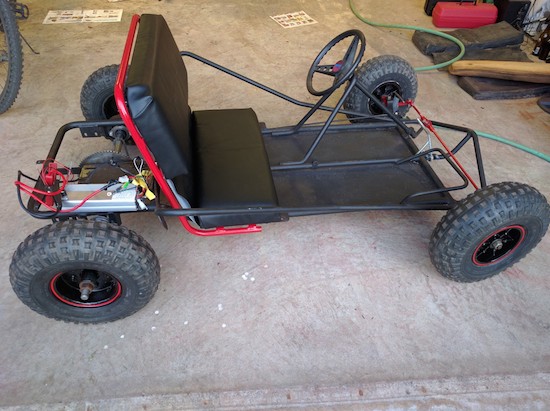![]()
Growing up, there was nothing cooler than hopping in a go-kart for a quick spin around the neighborhood. But you know what would make it even cooler? If you built your own electric set of wheels. That’s exactly what two engineering students, Adrian Georgescu and Masoud Johnson, have done using commonly available components along with a secondhand frame they picked up for $125 and a few Arduino.
Although they initially targeted a motor power output of 3kW, they were unable to find any that fit their budget. So as any true Makers would do, the duo settled on creating one out of an old Subaru alternator instead. Price tag? $30.
For the rest of their project, Georgescu and Johnson used an electric scooter’s three-phase motor controller, three LiPo battery packs, a trio of Arduino Pro Minis, and an Arduino Mega. The Arduinos are tasked with throttle control, speed sensing, RPM measurement, and transmitting the data over to a virtual dashboard on an Android app.
To finish off the build, the students reupholstered the seat, painted the chassis red and black, and threw on 60 LEDs. You can see the end result in action below, as the e-kart reaches a top speed of roughly 33mph (53km/h).
This entry was posted by Arduino Team on Monday, August 15th, 2016 and is filed under Arduino, Featured, Mega, Pro Mini. You can follow any responses to this entry through the RSS 2.0 feed.
You can leave a response, or trackback from your own site.
You must be logged in with your Arduino account to post a comment.
How to control Arduino board using an Android phone
Arduino IDE 1.6 is released! Download it now
DIY less-expensive Thermal imaging camera
Send in the clones
My open-source, do-it-yourself cellphone (built with Arduino).
Welcome Arduino Yún – the first board combining Arduino with Linux
Microsoft and Arduino: new partnership announced today
A low-cost robotic hand (tutorial) mirroring your own fingers
Arduino IR Remote Control
Nice drawings of the Arduino UNO and Mega 2560
David Cuartielles (Spanish)
MAKE: Blog’s Arduino archive
Tom Igoe’s PComp Site

